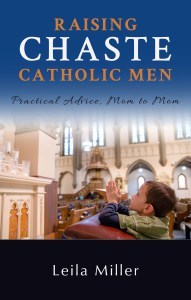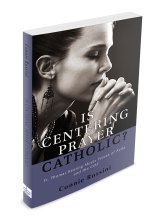Connie Rossini's Blog, page 4
December 27, 2016
A Beautiful Christmas to you and yours
It’s Christmas! Time for my annual family update. These posts are a little more personal and less serious than my normal writings. If you are new to the blog, bear with me, or just enjoy the photo and skip the rest. I promise my next post will be deeper and more spiritual! As always, I started with my Christmas letter, then redacted my kids’ names to just their initials to protect their privacy online.
Dear Friends and Family,
In honor of J’s starting kindergarten, we present our year in ABCs:
A is for Aldi, which opened in New Ulm this fall, saving us monthly trips to Mankato.
B is for Bob Books. J read seventeen of these readers.
C is for CS6. M (12) and C (10) learned Adobe Creative Suite to help Dan with movie production.
D is for Do-it-yourself. Dan installed luxury vinyl tile in the kitchen and it looks marvelous!
E is for Ears. J laughed at movies for the first time, once we tackled his hearing problem.
F is for Fantasy Football Fizzle. Sorry, D!
G is for Garden. We planted hostas, ferns, columbine, and ground-cover roses.
H is for High School. D graduated from elementary homeschool. Now the fun really starts.
I is for Ingalls. Little House on the Prairie plays at our house on Sunday evenings.
J is for Jalapeños. I picked our final crop on November 18. Global warming, or my green thumb?
K is for Kindle. A Spiritual Growth Plan for Your Phlegmatic Child hit virtual shelves last winter.
L is for Legos. M and C build castles and star ships and pyramids. (Oh my!)
M is for (stop) Motion. M makes animated movies with their constructions.
N is for Novel. I’m back to writing fiction, a YA novel connected to The Interior Castle.
O is for Online. Homeschool Connections provides our science, apologetics, and government courses.
P is for Painting. Our main living areas now evoke maple nut ice cream.
Q is for Quiet. Wait, we didn’t experience any. Maybe in 2017? Please?
R is for Retreat. Homeschool moms in Winona attended my first all-day event in March.
S is for Shakespeare. D and M sampled the Bard with parts of The Hollow Crown.
T is for Thanksgiving with the Joe and Gwen Rossini family. Lovely and noisy.
U is for Up late. C saves his energy until 10 PM. We are tired!
V is for Video. Dan produced the Diocesan Ministries Appeal video. He’s forming a new side business.
W is for Wisconsin. In August we visited La Crosse and the Shrine of Our Lady of Good Help in Green Bay.
X is for strike – in bowling. We knocked down pins together all summer. D joined the Junior League.
Y is for Youth Group. D and M camped with seminarians and adored the Eucharist with their peers.
Z is for Zimbos. The toddler block game morphed into ultimate Zimbo Football. Guess whose idea that was?
Have A Beautiful Christmas!
Connie Rossini, with love from Dan and the boys

December 14, 2016
Seeking God with John of the Cross
For the Feast of St. John of the Cross, I’d like to look at a common error in counterfeit contemplation such as Centering Prayer. New Age theologies do not see any separation between God and the soul. In fact, to many New Agers, God and the soul are the same thing. This error pops up in nearly every conversation I have with Centering Prayer practitioners. Here is a comment from a practitioner from an exchange on Leila Miller’s blog, Little Catholic Bubble:
“God is omnipresent. We cannot, not be in God’s presence. We are human and in our fallen nature we have difficulty having an awareness of God’s presence.”
The need for moral conversion
This is true, but misleading. One can be present in different ways. God is present in all that exists, yet morally speaking we can be separated from Him due to sin. In fact, since Adam’s sin, we are all (with two exceptions!) born this way, morally separated from God. Acknowledging that God is present everywhere is not enough for union with Him. We need a moral conversion, not just an awareness or consciousness.
Thankfully, both Teresa of Ávila and John of the Cross address this issue.
We must draw near to God
Here is St. John’s doctrine on “Seeking the Hidden God.” This long quote comes from Union with God According to St. John of the Cross by Fr. Gabriel of St. Mary Magdalen, OCD. Unfortunately, this wonderful book is now out of print. If you can find one secondhand, pick it up!
“For the soul desirous of union, it is not enough to know where one ought to go to seek God; it also wants to find Him. The soul responds to the Spirit with a new question:
“‘Granted that He whom I love is within me, why do I not feel Him and do not find Him?’
“There is a great difference between having God and being introduced into His company, and thus living with Him.
“‘God is in me,’ the soul says, ‘why does He not reveal His presence to me?’
“To this the Saint will reply by explaining to us a whole plan of conquest. Listen to why the soul enamored of God and in whom He dwells does not feel Him:
“‘The reason for this is that He is hidden, and you do not hide yourself as He does so that you may find Him and feel Him. He who is looking for a hidden thing should secretly penetrate its hiding place, and when he finds it, he too is hidden as it is.’ (Spiritual Canticle I, 9)
“Yes, it is true, God is within us, but He is hidden, concealed under the cumulation of our too human preoccupations, all the obstacles to the fulfillment of personal plans for our own profit and gain, plans that we want to carry out without taking sufficient account of the divine will and of the rights of others. In our interior there is too often a whole world of tendencies, of influences, of very lively passions, that thrust us toward creatures and make us give them our heart. They make us place our hope in them and seek our comfort in the remembrance of them. So we live in this superficial world, which occupies us to such a point that it makes us forget that more profound life that we could live but do not live, that truly interior life where the soul could be in relation with its God, and could end by finding Him. The Lord waits for us, so to speak, in the depth of our soul, but we do not enter this depth, taken up as we are by ‘our affairs’ to which we give all our concern…
“‘Since therefore thy beloved Spouse (God) is the treasure hidden in the vineyard of your soul… it is necessary that you too, forgetting everything and withdrawing from all creatures, hide yourself, until you find Him in the intimate seclusion of your spirit. Here, with the door shut behind you, namely the will closed to everything, pray in secret to your Father, and then… in secret you will hear Him and love Him and enjoy Him… above all that the tongue and sense can understand.’ (Spiritual Canticle I, 9)”
God’s will or ours?
So there you have it. To find God in our souls, we must close our will to everything but Him. We must set aside our own plans and follow His plan. This is what it truly means to go into our room and close the door.
Silence is not enough. Awareness is not enough. Being physically alone is not enough. Setting aside all our thoughts and feelings during prayer gains us nothing.
What we need to set aside is our will, in so far as it is different from God’s will. If God wills for us is to meditate on Scripture, that’s what we should do. He will show us that His will for us has changed when He Himself begins to change our prayer. And this change will only take place when we have truly abandoned our will for God’s.
Have a blessed feast day!
Connie Rossini

September 30, 2016
Are you being faithful in little things?
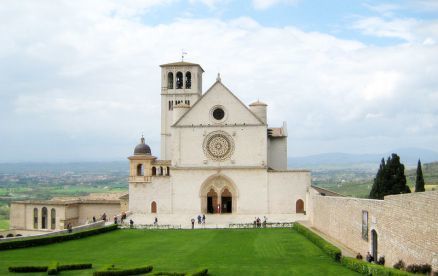
Basilica of St. Francis, Assisi (by Rjruiziii, Wikimedia Commons).
To enter the Kingdom of Heaven, we must become like little children. The Little Way of Spiritual Childhood set forth by St. Therese is popular among Catholics. But are we really willing to be little?
Over the last few days, I’ve been meditating on a section of Luke we heard recently at Mass:
“He who is faithful in a very little is faithful also in much; and he who is dishonest in a very little is dishonest also in much. If then you have not been faithful in the unrighteous mammon, who will entrust to you the true riches?” (Luke 16:10-11)
What is your “little”?
So, what is the little thing God is calling you to be faithful in? For me, it’s keeping my home in better order and concentrating on raising and teaching my children. All four of my boys are now studying in our homeschool, the eldest in ninth grade. It’s challenging to teach four different levels and make sure everyone gets the optimum education. We haven’t ironed out all the wrinkles yet. Until we do, I’ll be tempted to stress out.
God has been prompting me for a long time to spend less of my day online or in other writing activities and more time working on my primary vocation. My little homeschool is the little thing where God calls me to be faithful.
It’s easy to want to jump ahead to the “much.” I want to help people, like the readers of my blogs and my books. But first things must come first. So you’ll notice that I’m posting less often here and on my other blog. I am doing fewer posts at SpiritualDirection.com. I’m spending less time on social media and trying to stay focused on spirituality when I am logged in.
All this is challenging for me! I’ve heard this call for months. but typically phlegmatic, it’s taken me a long time to make needed changes. I feel guilty for not communicating with you more often — but I shouldn’t, because I’m following God’s will. I ask for your prayers and understanding. I will blog as it fits my life, rather than being a slave to a schedule.
What about you? Are you trying to do great things when you have mastered the little? Here are some other ways we can think about these verses.
Meditation before contemplation
We’d all like to be contemplatives. We’d love to sit in the silence (okay, maybe not some of you extroverts). We’d love to bask in God’s presence. But first things first.
First we must practice often mundane meditation on Sacred Scripture. We find prayer dry. Boring. Tedious. Long. Same thing, day after day.
There is no shortcut in the spiritual life, except the shortcut of St. Therese. That’s the Little Way! Become little. Do the little thing that seems beneath you, the boring thing that is your duty, the dry thing that shows you are in the relationship for love’s sake, not for consolation.
Don’t expect to be a contemplative quickly. Steer clear of anyone who promises you instant success. The road is narrow and long, but God picks up the little ones who are on it and carries them forward. We must be little enough for Him to lift!
Fix your house before God’s house
D and M read about St. Francis of Assisi in history his week. When God called St. Francis, He told Francis, “Repair my house.” Francis thought He meant a local church building that had fallen into ruin, but God meant for him to bring new life to the universal Church through the founding of a new order.
Nowadays, we all think we are St. Francis. We want to repair God’s Church. But we don’t want to start little, by picking up stones like St. Francis did, doing menial, thankless work. We want to go straight to fixing the universal Church!
We read about Pope Francis saying something off-the-cuff or writing letters to Argentinian bishops. We read about American bishops’ responses to Sen. Tim Kaine’s outrageous statements. We think, “The Church is falling to pieces, and I’ve got to fix it!”
So, we complain about the Pope and bishops on Facebook. We start pointing fingers. And all the while, it is our own house that is in ruins.
The dishes are turning moldy in the sink. The dirty laundry rivals the tower of Babel. The baby needs a bath. The middle schooler is floundering in Grammar. Our spouse longs for something beyond frozen pizza for dinner.
Or:
We’re on social media at work, because it’s much more important to tell our 1000 best friends that the Pope is flirting with schism than it is to be conscientious about doing the work we are being paid to do. After all, work is rather tedious. Boring. Meaningless. Dry. Same thing, day after day.
Or perhaps we’re not that ambitious. Perhaps we only want to fix the US. So we bad-mouth Hillary Clinton around the water cooler as though we can read her soul. As though God has made us her judge. But we can’t make a decision about a tiny project that the boss assigned to us.
True riches
God wants to grant us true riches, but He can’t. We’re not ready for them. We haven’t done the grunt work. Don’t you think it’s about time we did?
Connie Rossini
Note 1: Every year at this time I celebrate the feast of St. Therese by dropping my ebook of Trusting God with St. Therese to $.99. The sale goes today (September 30) through October 2. (This is an affiliate link.) Please tell your friends and family.
Note 2: Carmelite nun Elizabeth of the Trinity will be canonized on October 16. The Avila Institute is sponsoring a thanksgiving Mass in California in November. You can read more about it here. Please tell anybody you know who lives in the area.

September 24, 2016
Raising kids who remain in the Church
“Are you 100 percent certain the Catholic Church is right?” my son D (age 14) asked me the other day. We were discussing the fact that some friends on Facebook were concerned about their teenagers falling away from the Faith.
“I am sure,” I replied, “but if we were 100 percent certain, we would not need faith. There is no 100 percent certainty in this life.” I went on to share the following thoughts:
I inform my heart by prayer, experience, and the lives of the saints.
I inform my mind by studying the Bible, history, Church teaching, and apologetics.
When my mind doubts, I fall back on my heart.
When my heart doubts, I fall back on my knowledge.
Doubts are completely normal and usually nothing to worry about.
Questioning what your parents taught you is a normal and healthy part of growing up.
I told him about Pascal’s Wager.
I reminded him (and M, age 12, who was listening in) that I have asked myself nearly every question that can be asked concerning the Faith. I have questioned from almost every angle. And every answer points to the truth of Catholicism. No other answer satisfies my mind or heart, let alone both.
Can parents be friends with their kids?
I am pretty sure I have written about the fact that we should be both parents and friends to our kids. In fact, I thought I had this in my temperament books, but I could not find the quote. But recently I read these words written by fellow blogger Leila Miller, and I almost thought they were such a quote. I surely have thought them, if not written them:
“We’ve all heard it: ‘Children need a parent, not a friend!’ I had always agreed with this saying, even repeated it loudly myself, and yet I began to wonder: Are parenting and friendship mutually exclusive? When I reflected on my own experiences as a mother, I concluded that they are not. I began to recognize that, like all human relationships, the parent-child relationship is deeper than any slogan. I believe we can find a balance. I want to be, on an appropriate level, a true friend to my children.” (Leila Miller, Raising Chaste Catholic Men)
I remember a classmate in high school saying her mother was her best friend. Now, I’ve always loved my mom, though like most daughters I’ve sometimes clashed with her. When my dad had his head injury and I was the oldest girl in the house, my mom leaned on me a lot. And I can’t count the times I’ve leaned on her. But never until I was out of college and earning my own way in life did my mom and I have a relationship like friends. We were definitely mother and daughter. I envied my classmate’s relationship with her mom.
As an adult, I’ve seen the other side. I have known parents whom I thought were too friendly with their kids, who rarely if ever disciplined them even for egregious offenses. In the long run, that is not being a true friend. It’s shirking one’s God-given responsibility.
Homeschool parents can strike the right balance. I am with my kids 24/7. I not only love them, I like them.
This summer my boys and I went bowling once a week. As the school year neared, the clerk at the bowling alley told me about opportunities for the kids to continue bowling throughout the year. Then she mentioned a league just for moms. Wouldn’t it be nice to bowl with other women, instead of my kids?
I was nice and polite, knowing that although my kids have plenty of time to participate in a league, I don’t. But after we went home, I thought about the incident some more. I think the clerk felt sorry for me for “having” to bowl with my kids. As I told the family at dinner that night, there was no one I would rather bowl with, or do anything with–except my husband. My kids are great! I love spending time with them.
Do you have such a relationship with your kids? If not, how can you cultivate one?
Raising Chaste Catholic Men
In her book, Leila mentions being open to take on anything your kids ask about. If your daughter said she had doubts about the Faith, would you get defensive, angry, or silent? If your son asked why the Church teaches that premarital sex is wrong, would you “freak out?”
Open communication is essential to friendship. If you can’t discuss these things with your child, make sure your spouse can — and has an opportunity to do so. I encourage you to read Raising Chaste Catholic Men to learn how Leila and her husband handle this. Her two oldest sons (and two daughters) are now chaste Catholic adults.
Leila also talks about watching movies with her boys for fun. Yes! This is how my husband and I spend our Friday nights. In the last few weeks, we’ve introduced M to The Lord of the Rings movies, now that he and D are staying up later than their brothers. Every Sunday, we have family movie night, where we watch family friendly fare with the whole crew.
I read aloud to all the boys–even the high schooler–five days a week. We discuss books and movies at the dinner table.
We pray together.
Dan takes walks with the older boys, one at a time, regularly, discussing any private matters.
Our kids are our friends.
Trust and freewill
A few years back, I wrote a post called “10 Ways to Keep Your Kids Catholic.” One reader commented that we can’t keep our kids Catholic. They must choose to remain Catholic. Point taken.
Our kids have freewill. If they leave the Faith, that does not mean we failed. On the other hand, their freewill is a blessing, not a curse. It enables them to love God, not just serve Him out of compulsion.
I pray for my kids daily. I do my best (more or less!). Then I entrust them to God. God loves them more than I do. If they do stray, I trust He will bring them back, as he brought St. Augustine back to his mother St. Monica’s delight.
In the meantime, I tell D and M that having one of my kids leave the Faith is my greatest fear. I am encouraging them to practice mental prayer regularly, so their hearts too have experience of God. I am teaching them history, Church doctrine, apologetics, and how to read and understand the Bible. So when their hearts waver, they can fall back on their knowledge, and when their minds doubt, they can fall back on their hearts.
And I am encouraged by families like Leila’s who have raised several kids to faithful Catholic adulthood. May we all do the same.
Connie Rossini
Note: This post contains affiliate links, which means your purchase of Leila’s book will help cover the growing costs of maintaining my blog. God reward you!

September 3, 2016
Interested in a virtual retreat?
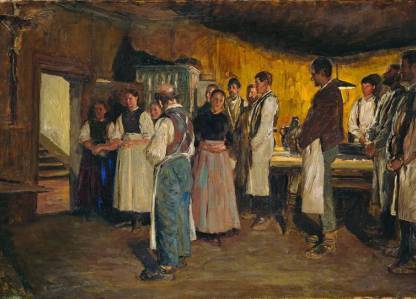
Vespers by Franz Skarbina (Wikimedia Commons). How about a spiritual retreat in your home?
I’m back to blogging after a short family vacation, then a project for another author. Here’s an idea I thought of some time ago, that I’d like to explore more fully: holding a virtual retreat.
Since I still have young children, I can’t travel much yet to give retreats to parish groups and associations. But I’d love to “meet” some of you in a more personal way than just through my blog. And I’d love to share the Church’s spiritual wisdom with you in a deeper way.
Before we can nail down any details, I need to hear from as many of you as possible. Could you please comment on any of the following?
Would you be interested in attending?
How much would you be willing to pay? (Don’t worry, I won’t hold you to your figure. I’m just seeing if it’s economically feasible.)
What theme would interest you most? Here are some ideas: Introduction to Mental Prayer, Contemplation, Contemplative Living, Learning to Trust God, Holiness in the Carmelite Tradition. Once we have a theme, I’ll try to come up with an exciting and appealing title.
I’m thinking 3 or 4 talks on a Saturday, with a chat room available for fellowship and scheduled time for reflection, mental prayer, Adoration, and Confession (at your own parish). Thoughts? Other ideas?
Have you ever run or participated in a virtual retreat before? Can you give me some idea what works and what doesn’t?
Do you have any suggestions for software we could use?
If you can’t attend the live retreat for some reason, would you be interested in accessing the taped conferences for a fee?
Anything else you can think of?
I love giving talks and retreats, and I know that good retreats are hard to come by. So I’m really hoping we can work something out here. The amount of interest you show by responding to my questions will help determine whether we proceed.
Thanks for your input!
Connie Rossini

August 4, 2016
Meditations on Vultum Dei quaerere for lay people

Discalced Carmelite Nuns of Nogoya, Argentina. Pope Francis addressed women such as these in his homeland in the Apostolic Constitution Vultum Dei quaerere. (Wikimedia Commons)
In July, Pope Francis issued an Apostolic Constitution on women’s contemplative life, called Vultum Dei quarere. Although aimed at orders of cloistered women religious, this document can also teach lay people how to enter into a more authentic relationship with Christ.
Vultum Dei quarere is Latin for “Seeking the Face of God.” The phrase comes from Psalm 27, my favorite Bible passage on prayer. I encourage you to prayerfully read and meditate upon the entire Psalm.
Vultum Dei quarere was addressed to women because they comprise the majority of contemplative orders. It is the first apostolic constitution for contemplative orders issued since Vatican II. Pope Francis wished to address problems in contemplative life that have gone unaddressed for decades, as well as encourage contemplatives in their increasingly counter-cultural vocation.
Here are some of the highlights of the document and my reflections on what we as lay people can learn from them.
A dialogue of love
“Seeking the face of God has always been a part of our human history. From the beginning, men and women have been called to a dialogue of love with the Creator. Indeed, mankind is distinguished by an irrepressible religious dimension that leads human hearts to feel the need – albeit not always consciously – to seek God, the Absolute.” (No. 1)
Meditate on that! Really, I mean it. So many of the errors in the way prayer is taught and practiced come down to a failure to recognize that prayer means seeking God’s face. Prayer is “a dialogue of love with the Creator.” The desire for God is inborn. Nothing else satisfies the human heart. We long for an eternal love.
Ask yourself:
Has my prayer become mere rote?
Do I dialogue with God in prayer, or just talk at Him?
Am I seeking a new consciousness or an encounter with a divine Person?
Do I feel drawn to a closer union with God in prayer?
City on a hill
Cloistered religious are called to become “a living exegesis of God’s word” (No. 2). In other words, they are a living, breathing interpretation of Sacred Scripture. Or, as the document goes on to say:
“The presence of communities set like cities on a hill or lamps on a stand, despite their simplicity of life, visibly represent the goal towards which the entire ecclesial community journeys. For the Church ‘advances down the paths of time with her eyes fixed on the future restoration of all things in Christ’, thus announcing in advance the glory of heaven.”
If these women are a city on a hill for us, shouldn’t we be learning more about their life, pondering what they can teach us? Long ago a friend presented me with the book My Beloved: The Story of a Carmelite Nun by Mother Catherine Thomas. This beautiful true story about life in a 20th century American cloister is now out of print. I encourage you to read it if you can find a used copy. If you have read similar books, especially any newer ones, please share them in the comments. Many movies in the last decade have also given us a peek within the cloisters. I hope and pray we’ll continue to see efforts like this.
“The monastic life, as an element of unity with the other christian confessions, takes on a specific form that is prophecy and sign, one that ‘can and ought to attract all the members of the church to an effective and prompt fulfilment of the duties of their christian vocation’.” (No. 4)
Ask yourself:
Am I as devoted to following God’s will in my vocation as a cloistered religious is?
Have I forsaken all worldly ambitions to follow God’s will alone?
Do I see the duties of my state in life as a means for holiness and union with God?
Am I quick to respond to the promptings of the Holy Spirit, or am I sluggish?
Contemplative values
“In these past decades, we have seen rapid historical changes that call for dialogue. At the same time, the foundational values of contemplative life need to be maintained. Through these values – silence, attentive listening, the call to an interior life, stability – contemplative life can and must challenge the contemporary mindset.” (No. 8)
Ask yourself:
What can contemplative orders teach me about silence?
About attentive listening?
About my call to the interior life?
Is the Holy Spirit prompting me towards greater silence and simplicity in our noisy, distracted culture?
“Over the centuries, the Church has always looked to Mary as the summa contemplatrix.” (No. 10).
I love that phrase, summa contemplatrix! Mary is the great contemplative, the mother of all who seek the face of God. She is our model. She is our help. We turn our faces toward her and she turns them toward Christ her Son.
“Contemplatives appreciate the value of material things, yet these do not steal their heart or cloud their mind; on the contrary, they serve as a ladder to ascend to God… Contemplation thus involves having, in Christ Jesus whose face is constantly turned to the Father, a gaze transfigured by the working of the Holy Spirit, a gaze full of awe at God and His wonders.” (Nos. 10-11)
Ask yourself:
Do I still have a sense of wonder about the world?
If not, how might I get that back?
Do I instill this wonder in my children?
Do I let material things lead me beyond themselves to God, or do I mistake the means for the end?
Noonday devil
Number 11 uses a phrase hardly ever heard any more– the midday (or noonday) devil. Pope Francis reminds us that the Desert Fathers faced:
“the temptation to listlessness, mere routine, lack of enthusiasm and paralysing lethargy.”
Since reading Vultum Dei quaerere, I’ve become more aware of this temptation to acedia in my daily life. How often do I finish a project and then feel restless! How often when I feel my prayer is useless or empty am I really just being tempted by the noonday devil?
Growth in holiness or just in numbers?
Parents, homeschoolers, catechists, pastors, and all who accompany others on their journey toward God can learn from No. 15, which states that “ample time must be reserved” for the formation of new candidates before they make their final vows.
Ask yourself:
Do I expect too much, too soon of my children, students, or new converts?
Am I too focused on numbers, ages, and statistics, instead of on true conversion of heart?
Do I give others ample time and space to grow?
Do I expect everyone to follow the same path down which God has led me?
Prayer, Word, and Sacrament
Perhaps my favorite section is this:
“Today many persons do not know how to pray. Many simply feel no need to pray, or limit their relationship with God to a plea for help at times of difficulty when there is no one else to turn to. For others, prayer is merely praise in moments of happiness.” (No. 16)
Can I cut these sentences out and send them to every priest I know? Please, teach us to pray!!!! Teach us this:
“Personal prayer will help keep you united to the Lord like branches on the vine, and thus your life will bear abundant fruit.”
From this point, the document begins to speak of new regulations for cloistered religious, including frequent Reconciliation, Eucharistic Adoration, and Lectio Divina.
“The entire Church, and especially communities completely devoted to contemplation, need to rediscover the centrality of the word of God, which, as my predecessor St. John Paul II stated, is the ‘first source of all spirituality’. The word of God needs to nourish your life, your prayer, your contemplation and your daily journey.” (No. 19)
Ask yourself:
How often do I make use of the Sacrament of Reconciliation?
Do I or can I make time for Eucharistic Adoration?
Am I devoted to the Eucharist at Mass?
Does the word of God enrich my whole life, through the liturgy, study, and meditation?
You can read the whole document here. I’d love to hear your reaction in the comments!
Connie Rossini

July 14, 2016
Giveaway and anniversary sale on all books!
It’s time to celebrate! Two years ago, On July 16, 2014, I published Trusting God with St. Therese. God has been so good, touching thousands of people’s lives through this book. He has also helped me bring three more books to publication since then.
In thanksgiving, I’m offering all of my ebooks for $.99 or less for the next 5 days. That includes A Spiritual Growth Plan for Your Phlegmatic Child and Is Centering Prayer Catholic? Neither of these ebooks has even been discounted before.
A Spiritual Growth Plan for Your Choleric Child is also just $.99. And of course Five Lessons from the Carmelite Saints is free as always. You can also (as always) download Determining Your Child’s Temperament free from Smashwords or for $.99 at Amazon.
All special ebook sales are available through Amazon only. Some ebooks are only discounted in the US, so please check prices carefully if you live elsewhere.
I am also discounting all of my paperbacks for 5 days only. Order signed copies directly from me for a discount of 20% plus free shipping. I have never offered prices this low. Email me for paperback orders.
If you’ve been thinking about ordering copies for friends or family, this is the perfect time to do it. The sale runs July 15-19, beginning and ending at 8 AM Central.
But wait, there’s more! 
July 7, 2016
Are you at home in the world?

Christ and the Rich Young Ruler by Hoffman (Wikimedia Commons). Too many possessions can erase our longing for Heaven.
Last Fall we helped my parents move from their home of 39 years to a senior co-operative. As is usual for people preparing to move, they spent some time fixing up their home before putting it on the market. They repainted every room, installed hardwood floors, and bought new curtains and light fixtures. My mom confessed that it looked so nice, she did not want to leave.
What does this have to do with the spiritual life? More than you might think. We face a persistent danger that life in the world will get too comfortable. What if we don’t want to leave?
Abraham’s example
Our father in faith Abraham teaches us the proper attitude.
“By faith Abraham obeyed when he was called to go out to a place which he was to receive as an inheritance; and he went out, not knowing where he was to go. By faith he sojourned in the land of promise, as in a foreign land, living in tents with Isaac and Jacob, heirs with him of the same promise. For he looked forward to the city which has foundations, whose builder and maker is God.” (Heb 11:8-10)
We are not really settlers on earth. Abraham was a nomad. He had no permanent home here. Today we might think of ourselves as renters. We need to care for what we have, but not because possessions are a priority. We care for them precisely because they are not our possessions. Everything we have belongs to someone else, given to us in trust.
St. Paul wrote:
“I mean, brethren, the appointed time has grown very short; from now on, let those who have wives live as though they had none, and those who mourn as though they were not mourning, and those who rejoice as though they were not rejoicing, and those who buy as though they had no goods, and those who deal with the world as though they had no dealings with it. For the form of this world is passing away.” (1 Cor 7:29-31)
The blessings of poverty
Do I need to say that our culture’s wealth is crippling people’s souls? Historically, saints and theologians have linked the sins of greed and lust. Msgr. Charles Pope writes:
“And this is greed, the insatiable desire for more, or the inordinate desire for things, such that they are considered apart from wider norms that limit desires with the boundaries of what is reasonable and in service of the common good. Greed cares little for the common good, for the needs and rights of others. Greed just wants what it wants. Lust is very close to greed in that it is also an inordinate desire for bodily pleasures apart from any consideration of the needs of others or of what it just, right and reasonable.”
The whole post is worth reading.
I don’t think it’s coincidence that sexual immorality is rampant at this time when even lower-middle class people live better than kings did in previous centuries.
When we surround ourselves with nice things, we begin to get comfortable. There is nothing wrong with being comfortable, but we can become too comfortable. So comfortable that we no longer feel a yearning for God.
Our home has been very needy since we bought it and I’ve never felt quite “at home” in it. But lately we’ve been doing more remodeling, and suddenly I like it. I find myself tempted to find peace in my surroundings, rather than in God.
The Evangelist Luke wrote, “Blessed are you who are poor, for yours is the kingdom of heaven” (Lk 6:20). I have never been really poor. But neither have I ever had much extra money. I think that’s been a blessing, although sometimes in disguise.
Spiritual Poverty
We can maintain a spirit of poverty even in the midst of riches. Saints like King Louis exemplified this. But it’s not easy. Recall these words of Jesus:
“It is easier for a camel to pass through the eye of a needle than for a rich man to enter the kingdom of heaven” (Mt 19:24).
And we also have the example of the rich young ruler, who went away sad when Jesus told him to give away his possessions.
How can we live in the spirit of poverty (which is what Matthew’s Gospel says will merit a reward), even if we have a lot of money?
Here’s a radical idea: meditate on death.
Are you ready to die?
You see, when we die, we will have to leave everything behind–literally. “You can’t take it with you.” If we try to, God will have to pry us free in Purgatory.
Meditating on death reminds us that life here is temporary. That we don’t belong here. That nothing we have is ours to keep. Someday, we will have to let go. Money will mean nothing in those last hours, besides perhaps the means of a little comfort care.
If we regret anything on our death beds, it won’t be that we did not own a bigger house or a fancier car or have a larger bank account. It won’t be that we had to rent instead of buy.
It will be that we did not love as we could have and should have.
Will it be easy for you to go when God calls you home? May it be said of us as of the saints of old:
“These all died in faith, not having received what was promised, but having seen it and greeted it from afar, and having acknowledged that they were strangers and exiles on the earth. For people who speak thus make it clear that they are seeking a homeland. If they had been thinking of that land from which they had gone out, they would have had opportunity to return. But as it is, they desire a better country, that is, a heavenly one. Therefore God is not ashamed to be called their God, for he has prepared for them a city.” (Heb 11:13-16)
Connie Rossini

June 28, 2016
St. Thomas Aquinas for Everyone (even 5-year-old kids)
Note by Connie: This is a guest post by Nancy Ward of JOYAlive.net. I am excited about reading this new series, since my husband studied to be a Thomist philosopher. I love this kind of stuff! Dave Palmer also teaches at Homeschool Connections, where my oldest two are now taking some courses.
“St. Thomas is the greatest doctor of the Church,” author Dave Palmer said, “and I assert that children can be taught his basic philosophy, as I do my 11- and 7-year olds.”
Let’s Go Find God is the enticing teaser of Volume I. The full title of the series tells it all: St. Thomas Aquinas for Everyone, 30 Quick and Fun Lessons, Activities and Outdoor Adventures Based on the Summa Theologica.
The arrangement, approach and intended audience make St. Thomas Aquinas for Everyone a dynamic tool to teach children the spirituality of awareness. Dave organized each of the 30 interactive lessons into six sections, including a Fun Activity and an Outdoor Adventure. My favorite section is Awe and Wonder, a reflection on the St. Thomas Says section and how it applies to my life.
Let’s Go Find God is the first of eight volumes that will eventually cover the entire Summa—the life’s work of the author whose day job has him directing a Catholic radio station.
He heard so much talk about St. Thomas in theology and liturgy discussions, Dave just knew he had to read the Summa Theologica. Eight years ago he started reading it, finished in 9 months, and immediately started over.
Summa simplicity
What struck him about the Summa was that it’s not complicated, as most people experience. “There was a simplicity that struck me very pointedly and unexpectedly,” he said.
“It changed the way I see the world!” Dave said. “Everything was different from before I read the Summa to after I read it. It gave me a blueprint for directing my life to God, to the way I live my life.”
To summarize the Summa, Dave evoked John 17:3, “Now this is eternal life, that they should know you, the only true God, and the one whom you sent, Jesus Christ.” Dave explained, ”It’s about knowing God! Ever since I read the Summa, I’ve had a burning desire to get to know God. Of course, God exceeds our ability to understand him. Is it impossible to know him? Well, no, because he’s left clues of himself everywhere we look.”
The Summa teaches that God is perfection. He is everywhere. In every moment he is around us, in everything. Dave thought, “Okay, I can go find God. Every single day of my life can be an exciting adventure. I can explore and find God in everything.”
Relevant now and eternally
The Summa helps us come to know God as much as possible now so we can prepare to live with him forever in heaven. That’s why Dave contends that St. Thomas remains relevant. And why the Church continues to encourage us in restoring Christian philosophy to counteract a myriad of atheist philosophies seeping into our culture.
“We don’t have to wait until our children are 18, and we send them off to college to their first philosophy class. We can teach them while their minds are absorbing everything.”
Dave thinks 5-year-olds can be taught basics of Thomistic philosophy, such as recognizing beauty and connecting it with God. For example, parents, grandparents and educators can instill simple principles about cause and effect. Discovering a leaf means a tree is nearby. Seeing the sun comes up means we have warmth and light. Using the Outdoor Activity guide, children see cause and effect in nature, reminders of God, our Creator.
Soon they engage in a deeper conversation with God. They are finding God through their senses, transcending the world. Awareness brings awe and wonder – and gratitude!
What are we waiting for? Let’s go find God!
St. Thomas Aquinas for Everyone is available in bookstores and on Amazon.com. (This is an affiliate link.)
Dave Palmer lives in Texas with his wife, Paula, and their three children. He earned a Masters degree in Theology from the University of Dallas and has spent the past ten years studying and teaching the theology and philosophy of St. Thomas Aquinas to young people through online courses and religious education classes at his parish. He serves as the Executive Director of the Guadalupe Radio Network’s Catholic radio station in North Texas. He has a passion for helping people of all ages to better know, love and desire God more passionately through a deeper understanding of St. Thomas Aquinas’ masterpiece, the Summa Theologica.
Save

June 22, 2016
To pray is human
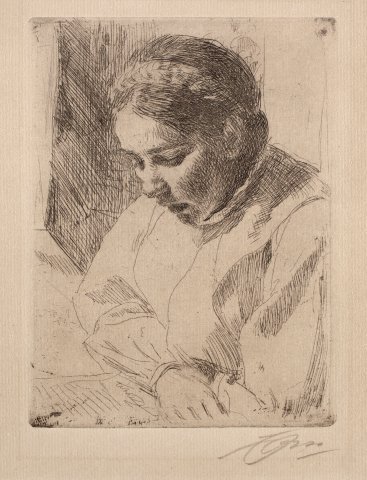
The Prayer by Anders Zorn (Wikimedia Commons). Don’t expect prayer in the early stages to be so different from the rest of life’s experiences.
Since starting my new website Is Centering Prayer Catholic?, I’ve been pondering why certain errors about prayer are so common. I think I’ve hit on a root misunderstanding that’s at the bottom of many of these errors: ignoring the distinction between the natural and the supernatural in prayer.
The Catechism quotes St. John Damascene in saying:
“Prayer is the raising of one’s mind and heart to God or the requesting of good things from God.” (No. 2559)
This indicates prayer is a human activity. One raises one’s own mind and heart to God. Note that this is not true of contemplative prayer. Contemplative prayer is a divine activity. As St. Paul says, “We do not know how to pray as we ought” (Rom 8:26), so God steps in to help us.
In this post, however, I wish to concentrate on the earlier stages of prayer, prayer in the Purgative Way. What common errors can we avoid by recognizing that prayer in the early stages is human? Here are six truths that people often misunderstand.
1. Prayer must become a habit.
The difficulty in establishing a prayer routine often surprises and discourages beginners. They think something is wrong with them if they keep forgetting to pray, or if prayer feels like a chore. Or they assume that since it’s hard for them to find a consistent time to pray, God must not require it of people in their state in life. So we see mothers, for example, who go for years without setting aside time for mental prayer. And we see lots of people giving up prayer as “not for me.”
But prayer is a human activity. Any time we start practicing something new, we must form new habits. Habits take time. They take effort.
How many times have we decided to start exercising more and failed? How about eating a healthier diet? Overcoming procrastinating? Being more organized? We’ve tried and failed, tried and failed, tried and failed.
Does that mean that “exercise is not for me,” or “God must not require me to eat what’s good for me,” or “I should just settle for being disorganized forever?”
Prayer is no different from any other habit. We set aside a specific time, we make a plan. We try. We fail. We try again. We ask for others’ support and prayers. And we keep going until the habit is formed.
If you are struggling to form the habit of prayer, don’t give up! Soon it will be as easy as brushing your teeth. Just give it and yourself time.
2. Distractions are normal.
How often do our minds wander while someone is talking to us? While we’re watching the evening news? While we’re listening to a lecture?
I imagine that Adam and Eve before the Fall had no interior distractions. But we do. Our minds wander. This is perfectly normal for fallen humans.
Do we worry that something is wrong with us when we don’t listen with attention to every word another says? Do we ask others what’s wrong with us? Do we give up having conversations? Of course not!
But somehow when it comes to prayer, we expect to have perfect attention from the first day. If we don’t, we think something is wrong with us. Nothing more than has been wrong with every fallen human being.
We don’t need special prayer methods like Centering Prayer to make ourselves hyper-focused. We just need some effort and practice, and trust in God when we fail. Involuntary distractions are no big deal and will not keep us away from intimacy with Christ.
3. Aridity is normal.
Do we feel an overwhelming love for our spouse every time we think of him or her? Do we always enjoy our vocation? No. Sometimes even our favorite people get on our nerves (without doing anything wrong!). Sometimes even our favorite activities grow stale. Sometimes everything and everyone leaves us bored and restless.
Now, we were made for God in a way we were not made for our spouse or our hobbies. But that does not mean that prayer should always feel good. We have ups and downs in prayer just as in everything else.
Dryness in prayer is normal. Getting bored while meditating on a favorite Scripture verse is normal. Feeling far from God when we are really pleasing Him is normal.
Emotions come. Emotions go. They have little to do with the quality of our prayer. In heaven we will find constant joy in the Beatific Vision. Until then, expect aridity.
4. Prayer uses our minds and hearts.
What separates humans from every other bodily creature? We have an intellect and a will. We can know and love on a level that lower animals cannot.
Since prayer is human activity at the beginning, we need to pray like humans. We use our minds, meditating on Sacred Scripture or the truths of the faith.We use our hearts, speaking loving words to God. We use our imaginations, picturing God or the saints or the Eucharist in our minds.
Any prayer that asks a beginner to set aside using his mind or heart is not a human prayer. No wonder Centering Prayer and similar errors lead people to deny their human nature!
Infused contemplation is a divine activity. When God initiates it, we quietly respond. Until then, we pray as humans should.
5. Locutions and visions are extraordinary.
This should be obvious by now. Divine messages, prophecies, and visions are not a normal part of prayer. They are unusual gifts from God. We should not expect them, and we should be somewhat circumspect when they come to us or others.
Prayer is about conversing with Christ. Nothing more (is there anything more?), nothing less.
6. Prayer is simple.
Now, prayer is not always easy, but neither is it complicated. We don’t need elaborate methods or techniques that require a retreat and continuing education to master. Prayerfully read Scripture, ponder it, talk to God about it. That’s the essence of mental prayer.
Prayer should be very natural. It is like talking to our best friend. But first, we listen to Him in the Scriptures. Then we respond.
I hope this post has helped you to see some of the common errors about prayer in a new light. Please ask any questions you have in the combox.
Connie Rossini
Save
Save
Save
Save




